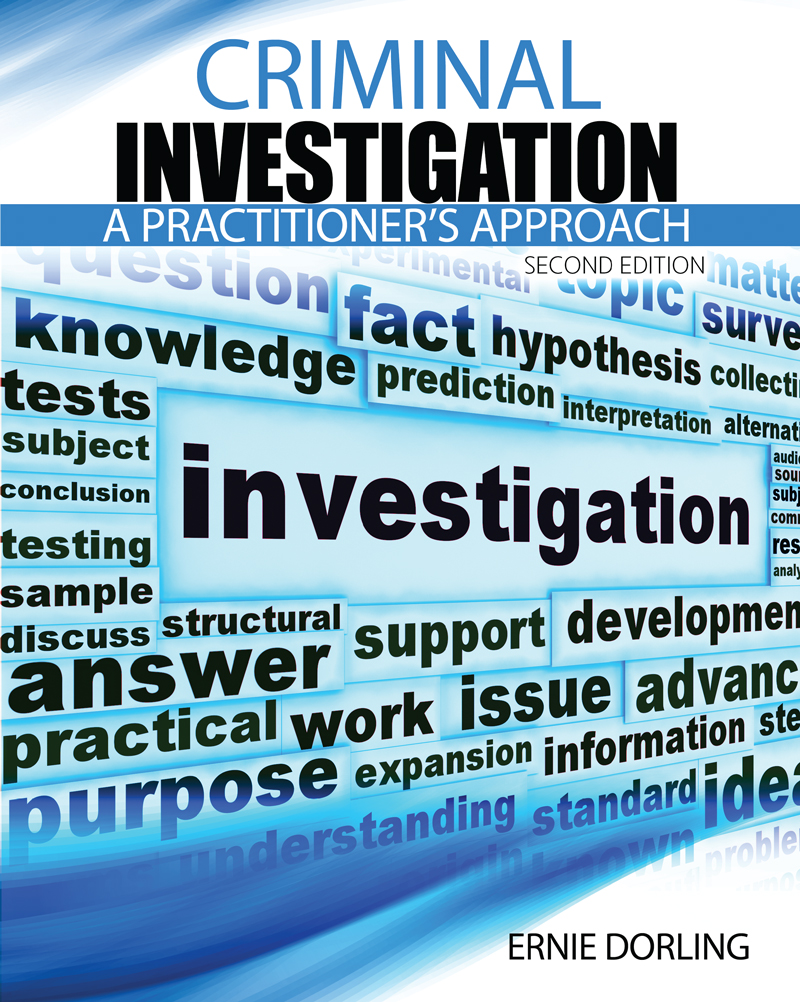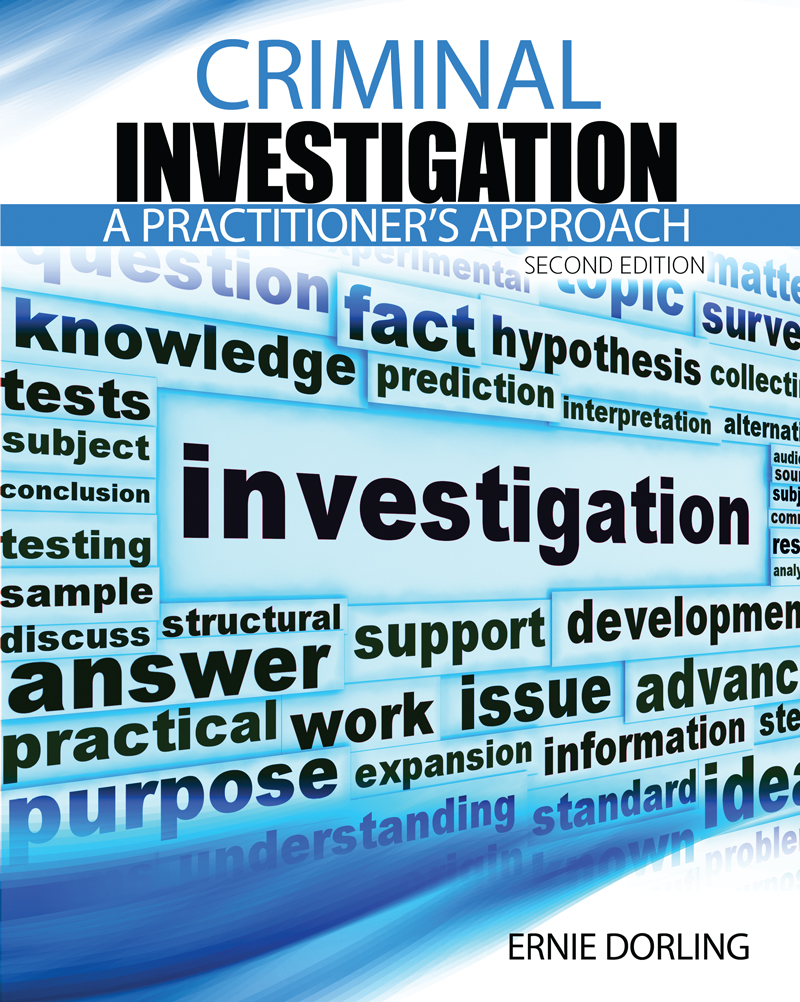Criminal Investigation: A Practitioner's Approach
Author(s): Ernie Dorling
Edition: 2
Copyright: 2018
Pages: 268
Edition: 2
Copyright: 2018
Pages: 264
A major difference between Criminal Investigation: A Practitioner’s Approach by Ernie Dorling and many of the other fine introductory books on criminal investigation is that this book aims to aid the student in walking and building the foundation of basic knowledge necessary to pursue a more advanced study of this topic.
Criminal Investigation: A Practitioner’s Approach takes a unique approach to teaching the subject of criminal investigation. Written in quasinovel format, students will learn the basic principles of criminal investigation through character dialogue. At the end of each chapter, there are, in most cases, questions for discussion and exercises. The exercises are designed to have the students inject themselves into the investigation by completing certain tasks that may or may not further the investigation.
Criminal Investigation: A Practitioner’s Approach guides students through an analytical thinking process both through the dialogue of its characters and through the Discussion Questions and Exercises found at the end of each chapter. In most cases, these discussion questions allow the student and instructor to delve more deeply into the evidence and the case being presented. The exercises, in a number of instances, allow the student to actually inject themselves into the investigative process in order to move the investigation along. Hopefully, the students and instructors will find this approach to be one that makes learning fun.
Preface
Acknowledgments
Introduction
Characters
Chapter 1 Burglary
Chapter 2 Arson
Chapter 3 The Crime Scene
Chapter 4 Interviews and Interrogations
Chapter 5 Case Reporting
Chapter 6 Investigative Sources of Information
Chapter 7 Environmental Crime
Chapter 8 Managing Investigations
Chapter 9 Legal Aspects of an Investigation
Chapter 10 Money Laundering
Chapter 11 Identity Theft
Chapter 12 Computer Crime
Chapter 13 Death Investigation
Chapter 14 Conspiracy and Organized Crime
Chapter 15 Case Summary
Federal Statutes
Index
Ernie Dorling has been involved in law enforcement for over 25 years. After leaving the Marine Corps in 1975, he joined the Hollywood, FL police department. In 1978, he became a Special Agent with the Bureau of Alcohol, Tobacco and Firearms in the Georgia field office. In 1986, Ernie joined the Defense Criminal Investigative Service (DCIS). During his time with DCIS, he was posted in Atlanta, Georgia; Wiesbaden, Germany; Washington D.C.; and finally, he was the Resident Agent in Charge of the Hartford, CT office until his retirement in 2001.
Immediately after retiring, Ernie Dorling began teaching criminal justice at Tunxis Community College in Farmington, CT. In 2004, he joined the criminal justice department at the Henry Lee School of Criminal Justice and Forensic Sciences at the University of New Haven in CT. During his tenure at UNH, he has focused his teaching on criminal investigation and white-collar crime investigation. In addition to his academic responsibilities, Ernie has participated in teaching a number of cold case seminars to police officers from around the country.
Ernie Dorling holds a Bachelor’s of Science Degree in Criminal Justice from Nova University in Fort Lauderdale, FL. He went on to complete his Master’s Degree in Public Administration from Troy State University in Alabama. He has also completed post-graduate work at the University of Connecticut.
Ernie Dorling has appeared on radio and local and national television shows discussing a variety of criminal justice issues. He is also the author of several professional and academic journal articles dealing with criminal justice issues and police executive leadership.
The desire of every educator is to have students who are interested in and energized by the topics being covered in that class. The challenge is to figure out ways to support critical thinking and objective analysis and not merely to entertain. Professor Dorling may have found the effective formula: using a case study/crime fiction format to introduce the various aspects of criminal investigation coupled with the detailed examination necessary to unravel the puzzle of aberrant human behavior. This is the type of textbook that not only will appeal to the wide variety of students who may want to enter law enforcement as a career but also will provide even the casual student with a thorough understanding of the complexities of criminal investigation.
Cathryn Addy, Ph.D. President, Tunxis Community College
Many of us who teach will agree that we have a “dirty little secret”: our students don’t read their textbooks. This book, using narrative fiction to illustrate specific teaching points in Criminal Investigation makes reading the text irresistible. When a local police department begins an investigation of a fire and explosion that destroys a private jet, the reader is immediately engaged and wants to read further to see what happens next. Basic investigation techniques and strategies are explained as the story unfolds and it is easy to see how the pieces fit into the entire investigation. A variety of current issues are covered such as environmental protection and in addition, the interplay between Dorling’s characters illustrates interpersonal issues such as tensions created when Federal, State and Local Police have to work together and ways that a rookie can get into trouble when dealing with a superior. Professor Dorling draws on his extensive experience as both a criminal investigator and a college professor to produce an engaging, thoughtful textbook which will be truly useful to instructors and students.
Lynn Monahan, Ph.D. Professor Emeritus, University of New Haven
The author has created an excellent learning venue for students by imbedding the student into a live case. There is no better way to learn than to participate in a case and make decisions as you develop information. What a great learning tool!
Michael R. Bouchard, ATF Assistant Director (Ret.)
A major difference between Criminal Investigation: A Practitioner’s Approach by Ernie Dorling and many of the other fine introductory books on criminal investigation is that this book aims to aid the student in walking and building the foundation of basic knowledge necessary to pursue a more advanced study of this topic.
Criminal Investigation: A Practitioner’s Approach takes a unique approach to teaching the subject of criminal investigation. Written in quasinovel format, students will learn the basic principles of criminal investigation through character dialogue. At the end of each chapter, there are, in most cases, questions for discussion and exercises. The exercises are designed to have the students inject themselves into the investigation by completing certain tasks that may or may not further the investigation.
Criminal Investigation: A Practitioner’s Approach guides students through an analytical thinking process both through the dialogue of its characters and through the Discussion Questions and Exercises found at the end of each chapter. In most cases, these discussion questions allow the student and instructor to delve more deeply into the evidence and the case being presented. The exercises, in a number of instances, allow the student to actually inject themselves into the investigative process in order to move the investigation along. Hopefully, the students and instructors will find this approach to be one that makes learning fun.
Preface
Acknowledgments
Introduction
Characters
Chapter 1 Burglary
Chapter 2 Arson
Chapter 3 The Crime Scene
Chapter 4 Interviews and Interrogations
Chapter 5 Case Reporting
Chapter 6 Investigative Sources of Information
Chapter 7 Environmental Crime
Chapter 8 Managing Investigations
Chapter 9 Legal Aspects of an Investigation
Chapter 10 Money Laundering
Chapter 11 Identity Theft
Chapter 12 Computer Crime
Chapter 13 Death Investigation
Chapter 14 Conspiracy and Organized Crime
Chapter 15 Case Summary
Federal Statutes
Index
Ernie Dorling has been involved in law enforcement for over 25 years. After leaving the Marine Corps in 1975, he joined the Hollywood, FL police department. In 1978, he became a Special Agent with the Bureau of Alcohol, Tobacco and Firearms in the Georgia field office. In 1986, Ernie joined the Defense Criminal Investigative Service (DCIS). During his time with DCIS, he was posted in Atlanta, Georgia; Wiesbaden, Germany; Washington D.C.; and finally, he was the Resident Agent in Charge of the Hartford, CT office until his retirement in 2001.
Immediately after retiring, Ernie Dorling began teaching criminal justice at Tunxis Community College in Farmington, CT. In 2004, he joined the criminal justice department at the Henry Lee School of Criminal Justice and Forensic Sciences at the University of New Haven in CT. During his tenure at UNH, he has focused his teaching on criminal investigation and white-collar crime investigation. In addition to his academic responsibilities, Ernie has participated in teaching a number of cold case seminars to police officers from around the country.
Ernie Dorling holds a Bachelor’s of Science Degree in Criminal Justice from Nova University in Fort Lauderdale, FL. He went on to complete his Master’s Degree in Public Administration from Troy State University in Alabama. He has also completed post-graduate work at the University of Connecticut.
Ernie Dorling has appeared on radio and local and national television shows discussing a variety of criminal justice issues. He is also the author of several professional and academic journal articles dealing with criminal justice issues and police executive leadership.
The desire of every educator is to have students who are interested in and energized by the topics being covered in that class. The challenge is to figure out ways to support critical thinking and objective analysis and not merely to entertain. Professor Dorling may have found the effective formula: using a case study/crime fiction format to introduce the various aspects of criminal investigation coupled with the detailed examination necessary to unravel the puzzle of aberrant human behavior. This is the type of textbook that not only will appeal to the wide variety of students who may want to enter law enforcement as a career but also will provide even the casual student with a thorough understanding of the complexities of criminal investigation.
Cathryn Addy, Ph.D. President, Tunxis Community College
Many of us who teach will agree that we have a “dirty little secret”: our students don’t read their textbooks. This book, using narrative fiction to illustrate specific teaching points in Criminal Investigation makes reading the text irresistible. When a local police department begins an investigation of a fire and explosion that destroys a private jet, the reader is immediately engaged and wants to read further to see what happens next. Basic investigation techniques and strategies are explained as the story unfolds and it is easy to see how the pieces fit into the entire investigation. A variety of current issues are covered such as environmental protection and in addition, the interplay between Dorling’s characters illustrates interpersonal issues such as tensions created when Federal, State and Local Police have to work together and ways that a rookie can get into trouble when dealing with a superior. Professor Dorling draws on his extensive experience as both a criminal investigator and a college professor to produce an engaging, thoughtful textbook which will be truly useful to instructors and students.
Lynn Monahan, Ph.D. Professor Emeritus, University of New Haven
The author has created an excellent learning venue for students by imbedding the student into a live case. There is no better way to learn than to participate in a case and make decisions as you develop information. What a great learning tool!
Michael R. Bouchard, ATF Assistant Director (Ret.)

